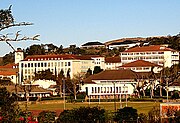Makana Botanical Gardens
| Makana Botanical Gardens | |
|---|---|
 | |
| Location | Rhodes University, Makhanda (Grahamstown), |
| Area | 60 hectares |
| Established | 1853; 171 years ago (1853) |
| Operated by | Rhodes University |
The Makana Botanical Gardens is a botanical garden in South Africa operated by Rhodes University, located in Grahamstown.
The garden is on Gunfire Hill and is surrounded by the 1820 Settlers National Monument, Fort Selwyn, the Albany Museum, and Grey Dam Lake.[1] The garden's 60 hectares (150 acres) have been planted with both native species and transplants for a long time, especially aloes, sycamores, and succulent varieties. One section was modelled after a typical English landscape garden, but has since fallen to neglect.
Each October from 2009 to 2013, a flower festival was held here. In 2014 the festival was moved to the 1820 Settlers' Monument for a November festival, due to fickle weather and late-blooming spring flowers.
History
[edit]The gardens were established in 1853 and was the second botanical garden to be founded in the Cape Colony.[2] A prospectus was compiled for the establishment of the gardens in 1846, but the establishment was delayed by the Frontier Wars. Sir Harry Smith, 1st Baronet and Sir George Cathcart were both present at the formal opening. The grounds are allegedly haunted by Smith's wife, Juana. The gardens were declared a national monument on 4 July 1994.
See also
[edit]References
[edit]- ^ DK Travel (2017). DK Eyewitness Travel Guide South Africa. Penguin. p. 257. ISBN 978-1465472625.
- ^ "History of the Gardens". Rhodes University. Archived from the original on 12 August 2011. Retrieved 22 March 2011.
External links
[edit]- "Makana Botanical Gardens". Rhodes University. Archived from the original on 12 August 2011.
- Makana Botanical Gardens, SA Venues
| Campus | ||
|---|---|---|
| Student life | ||
| People | ||
| Related | ||
33°18′56″S 26°31′15″E / 33.3156°S 26.5209°E / -33.3156; 26.5209 (Makana Botanical Gardens)
This South Africa location article is a stub. You can help Wikipedia by expanding it. |
This Eastern Cape location article is a stub. You can help Wikipedia by expanding it. |
This garden-related article is a stub. You can help Wikipedia by expanding it. |
- Pages using gadget WikiMiniAtlas
- Articles with short description
- Short description matches Wikidata
- Use dmy dates from April 2022
- Use South African English from August 2023
- All Wikipedia articles written in South African English
- Coordinates on Wikidata
- All stub articles
- Pages using the Kartographer extension


